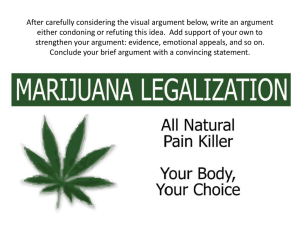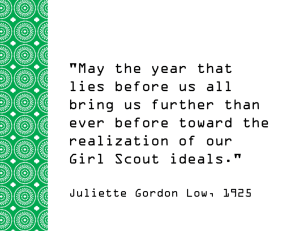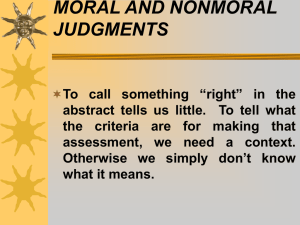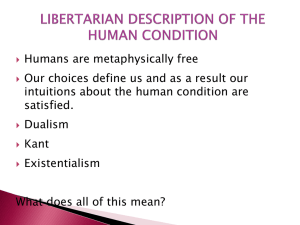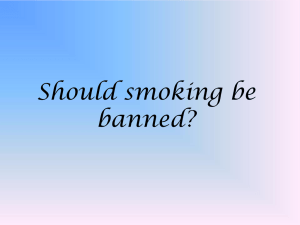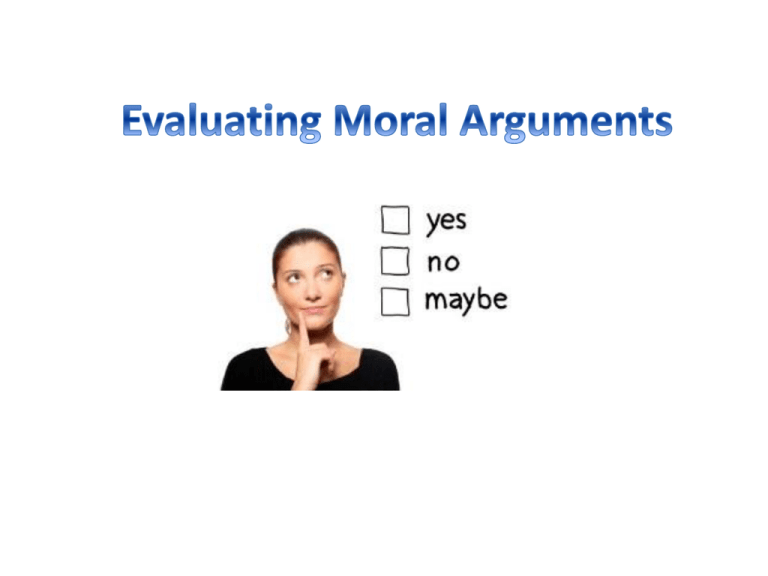
1. A statement is
a.an assertion about
morality.
b.an assertion without a
truth value.
c.an assertion that
something is or is not the
case.
d.a claim that cannot be
verified.
2. The utterance “Abortion a.an exclamation that
is morally permissible” is
expresses approval.
b.not a statement.
c.a statement.
d.an implied statement
3. In this argument—“(1)
a.conclusion; premise
Premarital sex is morally
permissible because (2) it b.premise; conclusion
makes people happy”—
statement 1 is the ______;
statement 2 is the ______. c.main argument; premise
•
d.implied premise; stated
premise
4. An argument in the logical
sense is a
a.heated exchange of views.
b.group of statements, one of
which is supposed to be
supported by the rest.
c.group of statements, all of
which make an assertion of
some kind.
d.group of unconnected
statements.
5. In an argument, the
supporting statements are
known as ______; the
statement being
supported is known as the
______.
a.inferences; conclusion
b.premises; deduction
c.premises; conclusion
d.indicator words;
conclusion
6. These words—because,
given that, due to the fact
that, and for the reason
that—are
a.conclusion indicators.
b.statement indicators.
c.statements.
d.premise indicators.
7. Deductive arguments
are
a.supposed to offer
probable support for their
conclusions.
b.usually valid.
c.usually invalid.
d.supposed to give logically
conclusive support to their
conclusions.
8. A valid deductive
argument with true
premises is said to be
a.strong.
b.sound.
c.fit.
d.cogent.
9. Inductive arguments are
a.intended to supplement
deductive arguments.
b.intended to be abductive.
c.supposed to offer only
probable support for their
conclusions.
d.supposed to give logically
conclusive support to their
conclusions.
a.argument is cogent.
10. In a valid argument, if
the premises are true,
then the
b.conclusion is not
necessarily true.
c.conclusion may or may
not be true.
d.conclusion absolutely
has to be true.
11. A strong inductive
argument with true
premises is said to be
a.strong.
.
c.valid.
b.cogent.
d.invalid
12. This argument [If the
dog barks, something
must be wrong;
something must be
wrong; therefore the dog
will bark.] has the form of
a.denying the antecedent.
b.modus tollens.
c.affirming the
consequent.
d.hypothetical syllogism.
a.Same-sex marriage is
harmful to society.
13. What is the implicit
premise in the following
argument?
Argument: Same-sex
marriage is contrary to
tradition. Therefore, it
should never be allowed.
b.Same-sex marriage is
unnatural and therefore
should be banned.
c.Whatever causes harm to
children should not be
allowed.
d.Whatever is contrary to
tradition should not be
allowed.
a.statement affirming that an
14. A moral statement is a action is bad or that a person is
bad.
b.statement asserting a valid
moral argument.
c.statement asserting that a
state of affairs is actual (true or
false) but not assigning a moral
value to it.
d.statement affirming that an
action is right or wrong or that
a person (or one’s motive or
character) is good or bad.
15. A statement asserting
that a state of affairs is
actual (true or false)
without assigning a moral
value to it is a:
a.nonmoral argument.
b.nonmoral statement.
c.valid statement.
d.strong statement.
16. What is the implied
premise in the following moral
argument?
• Argument: The war did not
increase the amount of
happiness in the world. So
the war was morally wrong.
a.If a war is immoral, it must
be considered morally wrong.
b.If a war does not increase
the amount of peace in the
world, it must be considered
morally wrong.
c.If a war does not increase
the amount of happiness in
the world, it must be
considered morally wrong.
d.Some wars increase the
amount of happiness in the
world.
17. What is a possible
counterexample to the
following moral principle?
• Moral principle: Lying is
always wrong.
a.In some cases, if lying can
save a person’s life, then lying
would not be morally wrong.
b.Lying to cheat your friend
out of money is morally
wrong.
c.Lying to save yourself from
embarrassment is wrong.
d.In some cases, if lying can
save a person’s life, then lying
would still be morally wrong.
18. The fallacy of assigning a.begging the question.
two different meanings to
the same term in an
b.equivocation.
argument is known as:
c.straw man.
d.appeal to ignorance.
19. What is the fallacy used in
the following passage known
as?
• Passage: If same-sex
marriage is legalized, young
people will assume that
being gay is socially
acceptable, and that will
lead them to give into the
temptation to become gay
themselves. And being gay
can ruin their lives.
Therefore, same-sex
marriage should not be
legalized.
a.straw man
b.slippery slope
c.appeal to the person
d.appeal to ignorance
20. What is the fallacy used
in the following passage
known as?
• Passage: No one can
prove that a fetus is not a
person from the moment
of conception. So a fetus
must be accorded full
moral rights as soon as it
is conceived.
a.appeal to ignorance
b.appeal to the person
c.slippery slope
d.faulty analogy
21. What is the fallacy used in
the following passage known
as?
• Passage: Liberals believe in
abortion on demand, which
means that killing a baby is
permissible any time at all.
At conception, in the second
trimester, at infancy—any of
these would be appropriate
times to kill a baby, says the
liberal.
a.appeal to the person
b.begging the question
c.straw man
d.equivocation
22. What is the fallacy used
in the following passage?
• Passage: John argues that
active euthanasia is
sometimes morally
acceptable. But we can
reject out of hand
anything he has to say
because he’s an
ultraconservative.
a.equivocation
b.begging the question
c.appeal to authority
d.appeal to the person
23. The fallacy of drawing
a conclusion about an
entire group of people or
things based on an
undersized sample of the
group is known as:
a.hasty generalization.
b.begging the question.
c.slippery slope.
d.faulty analogy.
Actions that disrupt the dayto-day functioning of a society
are morally wrong.
Taking the possessions of
others without permission
disrupts the day-to-day
functioning of American
society.
The “dumbest girls” took the
Girl Scout cookie money
without permission.
Therefore, the action of the
“dumbest girls” was morally
wrong.
• Inductive or deductive?
• Valid?
• Sound?
“A fundamental principle of
critical reasoning is that we
should not accept a
statement as true without
good reasons” (44).
Taking the possession(s) of
another person without that
person’s permission is illegal.
The “dumbest girls” took the
Girl Scout cookie money
without the permission of the
girl selling the cookies and the
Girl Scouts.
Therefore, what the “dumbest
girls” did was morally wrong.
• Inductive or deductive?
• Valid?
• Sound?
Stealing money is morally
wrong.
The “dumbest girls” stole
money from the girl selling
Girl Scout cookies.
Therefore, what the
“dumbest girls” did was
morally wrong.
• Begging the Question.
Most people believe that
taking the possession(s) of
another without permission
is morally wrong.
The “dumbest girls” took the
Girl Scout cookie money
without permission.
Therefore, what the
“dumbest girls” did was
morally wrong.
• Are the premises true?
• Is the form valid?
“We cannot reason that a
moral statement must be
true because a nonmoral
state of affairs is actual”
(54).
Taking the possession(s) of
another person without that
person’s permission is
always morally wrong.
The “dumbest girls” took the
Girl Scout cookie money
without permission.
Therefore, what the
“dumbest girls” did was
morally wrong.
• Valid?
• Sound?
To be “deserving” of something, is to be
“worthy” of the thing.
Each individual person deserves sole
proprietary interest in his/her body and
the fruits of the labor of his/her body.
Someone who maintains proprietary
interest is the only one who can transfer
that proprietary interest to someone
else.
If one receives proprietary interest that
is freely given by another, the receiver is
“deserving” of the proprietary interest.
To claim proprietary interest that has
not been freely given is immoral.
The 9-year old girl has proprietary
interest in the $168 because it is the
fruit of her labor.
The “dumbest girls” are not deserving
of proprietary interest in the $168
because it is not the fruit of their labor,
and they cannot claim to have
proprietary interest in the $168 because
it was not freely given by the 9-year old
girl.
Therefore, the “dumbest girls” do not
deserve the $168 and committed an
immoral act when they took the $168.
An act is morally right when it
produces a greater amount of good
for a greater number of people than
would have been created had the
act not been performed.
As a result of the “dumbest girls”
taking the Girl Scout cookie money,
the 9-year old girl made significantly
more money from cookie sales than
she would have made had the
“dumbest girls” not stolen the
money; the news media had a more
compelling newscast than they
would have had had they not stolen
the money; and PHIL 20 students
have an situation for ethical analysis
that is more entertaining than the
ones they would have if the girls had
not stolen the money.
• Because the action of the
“dumbest girls” produced a
greater amount of good for a
greater number of people
than would have been
created had they not
performed this action, their
action was morally right.
There is no objective truth.
Therefore, the “dumbest girls”
were both morally right and
Consequently, there is not
morally wrong for taking the
objective standard by which
one can judge the truth-value cookie money.
of a moral claim.
If follows that all judgments
about the truth-values of
moral claims are determined
by the individual person
making the judgment.
Because there is no objective
standard against which the
truth-value of individual moral
claims can be judged, all moral
claims are equally true.
If one is open-minded, one • Therefore,…
considers fairly all
……
information and viewpoints
relevant to a moral issue,
critically evaluate the
integrity of the arguments
offered, and be willing to
change his/her mind if
necessary when making
moral decisions.
Lenny is open-minded.
• If smoking marijuana interferes
with a person’s ability to
perform the essential functions
of a job, then smoking
marijuana is grounds for
denying a person employment.
• Smoking marijuana does not
interfere with a person’s ability
to perform the essential
function of a job.
• Therefore, smoking marijuana
does not serve as grounds for
denying a person employment.
If P, then Q.
Not-P.
Therefore, not Q.
If P, then Q.
Not-Q.
Therefore, not-P
• If smoking marijuana
interferes with a person’s
ability to perform the
essential functions of a job,
then smoking marijuana is
grounds for denying a person
employment.
• Smoking marijuana is not
grounds for denying someone
employment.
• Therefore, smoking marijuana
does not interfere with a
person’s ability to perform the
essential functions of a job.
If smoking marijuana does not interfere with a person’s ability
to perform the essential functions of a job, then smoking
marijuana is not grounds for denying a person employment.
Smoking marijuana does not interfere with a person’s ability
to perform the essential function of a job.
Therefore, smoking marijuana does not serve as grounds for
denying a person employment.
If smoking marijuana interferes with a person’s ability to
perform the essential functions of a job, then smoking
marijuana is grounds for denying a person employment.
Smoking marijuana interferes with a person’s ability to
perform the essential function of a job.
Therefore, smoking marijuana serves as grounds for denying a
person employment.
If P, then Q.
P.
Therefore,
Q. (valid)
Non-human animals have
less intelligence than
humans.
Therefore, animals should
be used for medical testing.
• Unexpressed
assumption?
• Valid?
• Sound?
• Precision problems?

